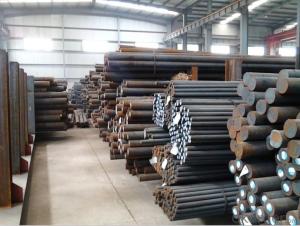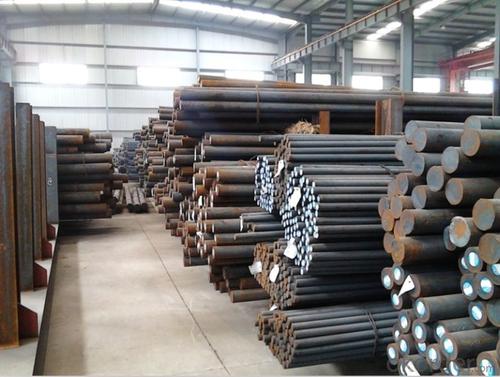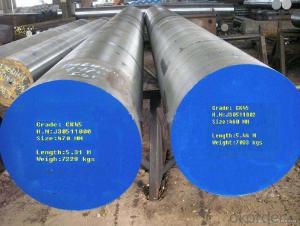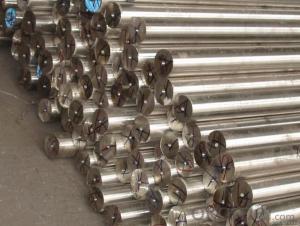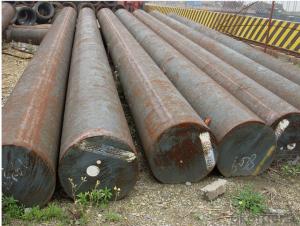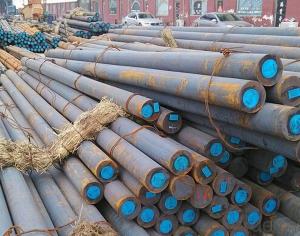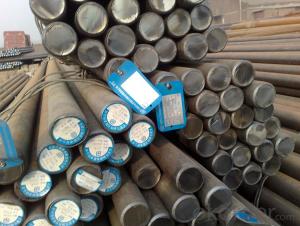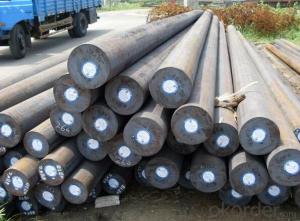Special Steel 1.2343 Round Forged Tool Steel
- Loading Port:
- China main port
- Payment Terms:
- TT OR LC
- Min Order Qty:
- 30 m.t.
- Supply Capability:
- 10000 m.t./month
OKorder Service Pledge
OKorder Financial Service
You Might Also Like
Specification
Specifications
1.2343 steel bars
1.Diameter:10mm~600mm,
2.Delivery Conditon:annealed, black/turned surface
3.Short Delivery Time
Product information
| 1.2343 steel round bars | |||||||||
| Chemical Composition(%) | |||||||||
| C | Si | Mn | P | S | Cr | Mo | V | W | Other |
| 0.33-0.43 | 0.80-1.20 | 0.20-0.50 | ≤0.030 | ≤0.030 | 4.75-5.50 | 1.10-1.60 | 0.30-0.60 | --- | --- |
| Specialty | |||||||||
| Harden and air cooling steel, 600`C work, high rigidity, high endurance, anti-heating, anti-cracking, electric sediment and middle-melting steel, compact structure, refined in electric cooker, quality of steel is pure, owned good character of equal direction. | |||||||||
| Use | |||||||||
| 1. Extrusion mold of aluminum and magnesium, die-casting mold, especially adapt to the mold in large and complicated form. | |||||||||
| 2. Extrusion mold of copper alloy, die-casting mold | |||||||||
| 3. Hot pressing machine mold | |||||||||
| Heat Treatment | |||||||||
1Annealing after forging:technology heat to 860-890°c,keep temperature 2-4H,furnace cold below 500°c,out and air cool,hardness ≤229HBS 2.stress relieving annealing technology :heat to 730-760°c,keep 3-4H,furnace cold and air cool. | |||||||||
| Melting Process | |||||||||
| 1. EAF: Electric Furnace+LF+VD(Optional) | |||||||||
| 2. ESR: Electric Furnace+LF+VD+Eleroslag Remelted(Optional) | |||||||||
| UT Class | |||||||||
| According to Standard of SEP 1921/84,100% Volume, Level C/c, D/d or E/e | |||||||||
| Tolerance on Quantity | |||||||||
| +/-10% Per Size | |||||||||
Product show
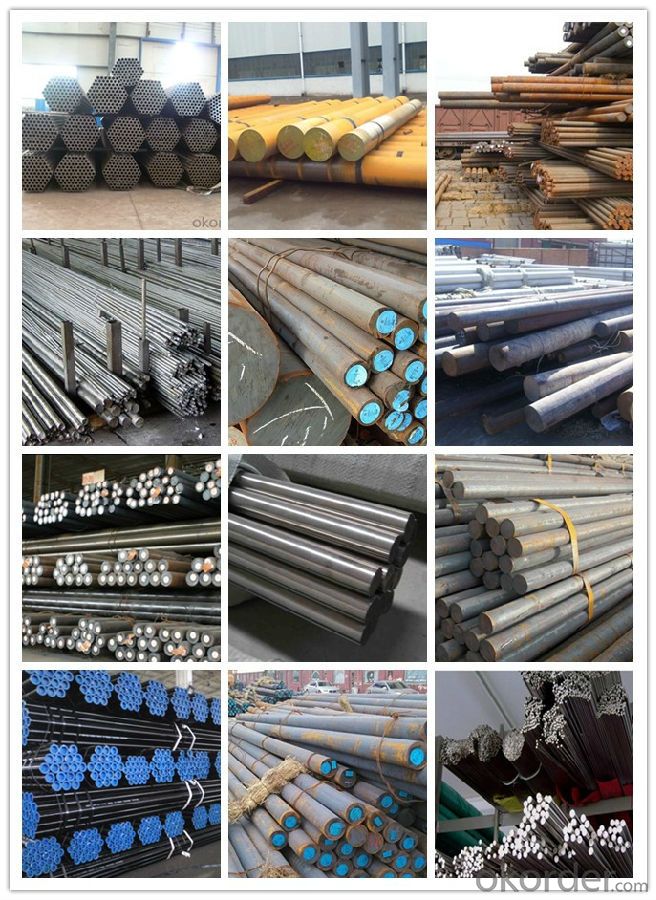
Workshop show
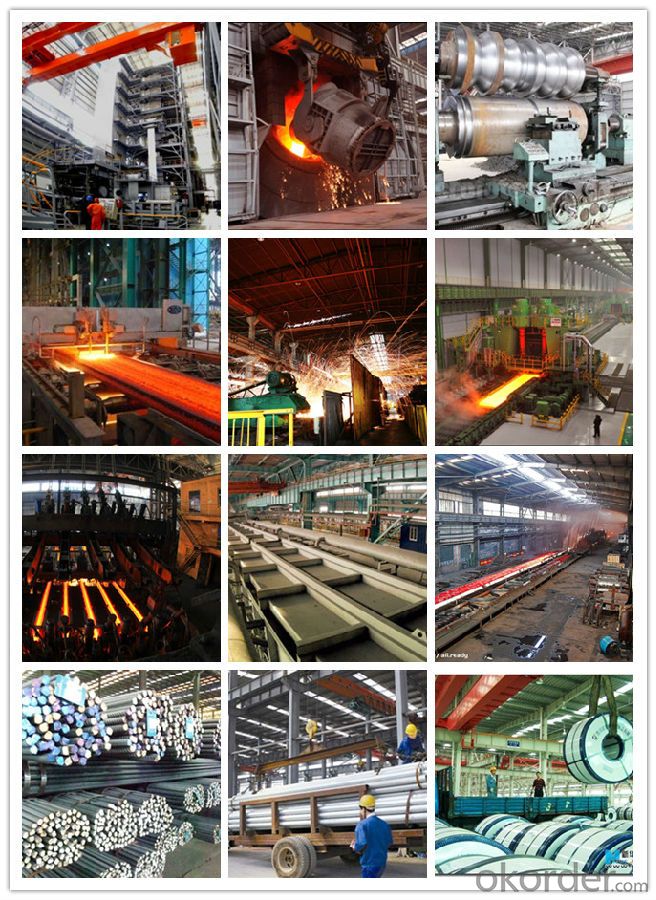
Shipping
1. FedEx/DHL/UPS/TNT for samples, Door-to-Door;
2. By Air or by Sea for batch goods, for FCL; Airport/ Port receiving;
3. Customers specifying freight forwarders or negotiable shipping methods!
Delivery Time: 3-7 days for samples; 5-25 days for batch goods.
Payment Terms
1.Payment: T/T, L/C, Western Union, MoneyGram,PayPal; 30% deposits; 70% balance before delivery.
2.MOQ: 1pcs
3.Warranty : 3 years
4.Package Informations: 1) EXPORT, In 20 feet (GW 25 ton) or 40 feet Container (GW 25 ton)
2)as customer's requirement
Why choose us?
(1) The leading exporter in China special steel industry.
(2) Large stocks for various sizes, fast delivery date.
(3) Good business relationship with China famous factories.
(4) More than 7 years steel exporting experience.
(5) Good after-sales service guarantee.
- Q: What grade of iron powder should be used for processing special steel? Are there any other elements on the request? How much are they?
- Special steel into high quality carbon steel, alloy steel, high alloy steel (alloy element is greater than 10%) three categories, including alloy steel and high alloy steel special steel production accounted for 70%.
- Q: Can special steel be used in the furniture manufacturing industry?
- Yes, special steel can be used in the furniture manufacturing industry. Special steel, such as stainless steel or alloy steel, offers a range of desirable properties like strength, durability, and corrosion resistance, making it suitable for various furniture applications. It can be used in the production of chair frames, table legs, hinges, and other components where strength and longevity are important. Additionally, special steel can also provide an attractive aesthetic appeal, making it a versatile choice for the furniture manufacturing industry.
- Q: How does wear-resistant steel protect against abrasive wear?
- Wear-resistant steel protects against abrasive wear by having a higher hardness and toughness compared to the material it is protecting. This allows it to withstand the impact and friction caused by abrasive particles, reducing the wear and increasing the lifespan of the steel.
- Q: What are the properties of case-hardening steel?
- Case-hardening steel is a type of steel that possesses surface hardness and wear resistance while maintaining a relatively soft and tough interior. It is achieved by introducing carbon into the outer layer of the steel through a process called carburization, which forms a hardened case. The core of the steel remains relatively softer, providing toughness and resistance to impact. This combination of properties makes case-hardening steel ideal for applications requiring a hard and durable outer surface, such as gears, bearings, and tools.
- Q: What are the advantages of using special steel in construction?
- The advantages of using special steel in construction include its superior strength and durability, which allows for the construction of taller and more complex structures. Special steel also offers excellent resistance to corrosion, fire, and extreme weather conditions, ensuring the longevity of the building. Additionally, it provides greater design flexibility, enabling architects and engineers to create innovative and unique structures. Finally, special steel is sustainable and recyclable, making it an environmentally friendly choice for construction projects.
- Q: Can special steel be used in food processing applications?
- Yes, special steel can be used in food processing applications. Special steel, such as stainless steel, is commonly used in the food industry due to its excellent corrosion resistance, hygienic properties, and durability. It is safe for food contact, easy to clean, and does not react with acidic or alkaline substances.
- Q: What are the main applications of special steel in the food packaging industry?
- Special steel is widely used in the food packaging industry due to its various applications. It is primarily utilized in the production of food cans, closures, and other packaging materials. Special steel offers excellent corrosion resistance, ensuring the preservation and safety of the packaged food. It also provides high strength and durability, maintaining the integrity of the packaging during transportation and storage. Additionally, special steel can be easily formed into different shapes and sizes, allowing for versatile packaging designs. Overall, the main applications of special steel in the food packaging industry include ensuring food safety, promoting product longevity, and enabling creative packaging solutions.
- Q: What are the properties of electrical steel?
- Electrical steel, also known as silicon steel or transformer steel, possesses several key properties that make it suitable for various electrical applications. Firstly, it exhibits low core loss, meaning it has a low tendency to dissipate energy in the form of heat when subjected to alternating magnetic fields. This property is crucial for efficient power transmission and distribution. Additionally, electrical steel demonstrates high magnetic permeability, enabling it to efficiently conduct and amplify magnetic flux, essential for transformers and other electrical devices. Furthermore, it has a high electrical resistivity, allowing it to minimize eddy current losses, which occur when currents circulate within the material. Lastly, electrical steel exhibits high saturation flux density, making it capable of handling high magnetic fields without reaching its magnetic saturation point. Overall, these properties make electrical steel an ideal material for power generation, transformers, motors, and other electrical equipment.
- Q: What are the common heat treatment methods used for special steel?
- There are several common heat treatment methods used for special steel to improve its mechanical properties and enhance its performance. Some of these methods include: 1. Annealing: This process involves heating the steel to a specific temperature and then cooling it slowly to relieve internal stresses and create a refined microstructure. Annealing helps to improve the machinability and ductility of the steel. 2. Normalizing: Normalizing is a heat treatment method that involves heating the steel to a temperature above its critical point and then cooling it in still air. This process helps to refine the grain structure of the steel, improve its toughness, and enhance its strength. 3. Quenching: Quenching is a rapid cooling process that involves immersing the steel in a quenching medium, such as water, oil, or polymer. This method is used to increase the hardness and strength of the steel by forming a hard martensitic structure. However, quenching can also introduce internal stresses and reduce the steel's toughness, so it is often followed by tempering. 4. Tempering: Tempering is a heat treatment method that involves reheating the quenched steel to a specific temperature and then cooling it gradually. This process helps to relieve internal stresses, reduce hardness, and improve the toughness and ductility of the steel. Tempering also helps to enhance the steel's resistance to brittle fracture. 5. Austempering: Austempering is a heat treatment method that involves quenching the steel to a temperature just above its martensitic transformation range and then holding it at this temperature until the austenite transforms into bainite. This process produces a unique microstructure that provides a combination of high strength and good toughness. 6. Martempering: Martempering is similar to austempering, but the steel is quenched to a temperature just below its martensitic transformation range and then held at this temperature until the transformation is complete. Martempering produces a microstructure with improved strength and toughness compared to conventional quenching. These heat treatment methods are commonly used for special steel to tailor its properties to specific applications and requirements. The choice of method depends on factors such as the desired mechanical properties, the steel's composition, and the intended use of the final product.
- Q: What are the different methods for improving the heat resistance of special steel?
- There are several methods for improving the heat resistance of special steel. These methods include: 1. Alloying: One of the most common methods is to alloy the steel with certain elements that enhance its heat resistance. For example, the addition of chromium, nickel, or molybdenum can significantly improve the steel's ability to withstand high temperatures. 2. Heat treatment: Heat treatment processes such as annealing, quenching, and tempering can be employed to enhance the heat resistance of special steel. These processes help in refining the microstructure of the steel and improving its mechanical properties, including heat resistance. 3. Surface modification: Applying specialized coatings or surface treatments can also improve the heat resistance of special steel. For instance, processes like nitriding, carburizing, or ceramic coating can create a protective layer on the surface of the steel, preventing oxidation and improving its ability to withstand high temperatures. 4. Grain refinement: Controlling the grain size of the steel through processes like grain refinement or recrystallization can enhance its heat resistance. Smaller grain sizes reduce the diffusion of atoms within the material, making it more resistant to high temperatures. 5. Precipitation hardening: Precipitation hardening is a technique where small particles are formed within the steel matrix, strengthening the material and improving its resistance to heat. This method involves a specific heat treatment process that enables the formation of these particles. 6. Controlled cooling: Optimizing the cooling process after heat treatment can also improve the heat resistance of special steel. By controlling the cooling rate, the formation of undesirable phases or microstructural defects can be minimized, ensuring better heat resistance. 7. Material selection: Choosing the right type of special steel with inherently high heat resistance properties is another method for improving heat resistance. For example, stainless steel, tool steel, or superalloys are known for their excellent heat resistance and are often selected for applications where high temperatures are involved. It is worth noting that the selection of the appropriate method or combination of methods for improving heat resistance depends on the specific requirements and constraints of the application.
Send your message to us
Special Steel 1.2343 Round Forged Tool Steel
- Loading Port:
- China main port
- Payment Terms:
- TT OR LC
- Min Order Qty:
- 30 m.t.
- Supply Capability:
- 10000 m.t./month
OKorder Service Pledge
OKorder Financial Service
Similar products
Hot products
Hot Searches
Related keywords
